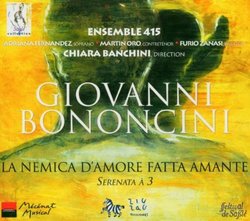| All Artists: Furio Zanasi, Giovanni Bononcini, Chiara Banchini, Martin Oro, Ensemble 415, Adriana Fernandez Title: Giovanni Bononcini: La Nemica d'Amore fatta Amante Members Wishing: 0 Total Copies: 0 Label: Zig Zag Territories Release Date: 1/13/2004 Album Type: Import Genres: Pop, Classical Styles: Vocal Pop, Opera & Classical Vocal, Historical Periods, Baroque (c.1600-1750) Number of Discs: 1 SwapaCD Credits: 1 UPC: 3760009290419 |
Search - Furio Zanasi, Giovanni Bononcini, Chiara Banchini :: Giovanni Bononcini: La Nemica d'Amore fatta Amante
 | Furio Zanasi, Giovanni Bononcini, Chiara Banchini Giovanni Bononcini: La Nemica d'Amore fatta Amante Genres: Pop, Classical
|
Larger Image |
CD Details |
CD ReviewsA voice teacher & early music fan George Peabody | Planet Earth | 01/29/2006 (5 out of 5 stars) "'LA NEMICA D'AMORE FATTA AMANTE' (THE ENEMY OF LOVE HAS FALLEN IN LOVE') Giovanni Bononcini(Modena 1670-Vienna 1747) is best known today for his dozen years in London, which began when he was 50 and Handel was 35. Five years later a well-known epigram likened them to Tweedle-dum and Tweedle-dee. Bononcini established his fame in the 1690's by composing more than 200 solo cantatas; six serenatas, each of which had 3 or 4 characters and in addition wrote five complete operas. In 1692 Bonancini was employed by the Colonna family in Rome, which proved to be a turning point in his life, for there he met Silvio Stampiglia,who became his librettist. This resulted in 6 Serenatas, one of which is on this disc.. Together they also wrote 5 operas and an oratorio. These works made Bonancini's name as a composer and man of the theatre. This music is in the form of a Serenata for three voices. The Serenata was a new type of cantata developed by Bononcini and A. Scarlatti. The 3 voices are: Soprano (Clori}sung by Adriana Fernandez,countertenor{Tirsi)sung by Martin Oro and Baritone (Fileno) sung by Furio Zanasi. The story is basically a love triangle with both men loving Clori. It's absolutely charming and delightful in every way. Clori, who is 'The Enemy of Love' refuses to relinquish her highly prized liberty. The complete score of this work does not survive, but one copy of the libretto is extant. There is however, a dedication for this work, written by Bononicini in which he requests a favorable reception for the 'poor sheperdess' (Clori). Such pastoral contexts were highly favored, since they embodied the ideals of the Arcadian Academy founded in Rome in 1690. The essence of Stampiglia's drama, brought forth by Bononcini'c music, is marvelously conveyed by the Ensemble 415's rendition (13 players) . The use of the Archlute at the opening playing dreamily for a brief time creates the perfect effect for the entering of the Ensemble and the first complete chord. There is no doubt that Clori (sop.Adrian Fernandez) is the fascinating focus of this work (7 arias,2 duets), while Tirsi (Martin Oro, Countertenor), whom she loves, has only 3 arias and l duet; and Fileno (Furio Zanasi-baritone), whom she repels, has 3 arias and 1 duet. Adriana and her Buenos Aires compatriot, Martin Oro, add ornamentation judiciously with a magical, if at times a bit rapidly, floating quality. Oro's arias are all moderately slow effectively conveying the dramatic function of each one. Zanasi sings his rapidly paced arias powerfully, each one filled with high drama, entering furiously with periodical jealous outbursts until he angrily departs with an invective-filled aria. Thus he and Oro are at opposite ends of the pole and vocal production. The singers do justice to the drama , and the singing is par excellence. There is an especially rich orchestral accompaniment with good balance between the singers and the orchestra. Bononcini took special pains to bring out the solo instruments, as in the arias of Clori, which is accompanied by a solo violin and Tirsi which features a solo on the cello. It's all incredibly beautiful and the voice of Martin Oro is divine! In 2003, when this serenata was 310 years old, it was given this 'most sumptuous' recording by Ensemble 415. It truly belongs to the collections of all who enjoy renditions of melodically, harmonically and texturally rich works composed near the end of the splendid 17th century. The album is beautifully packaged and includes pertinent information as well as the text in Italian, French, English and German." UNA EXCELENTE INTERPRETACION R. A. Garay | Santiago,Chile | 06/06/2004 (4 out of 5 stars) "Desconocido para muchos,Giovanni Bononcini fue un gran compositor barroco, del cual, lamentablemente tenemos pocas versiones diponibles. Esta interpretación es magnífica, el rol de Tirsi es maravilloso" Should be reissued J. Gabrielson | Walnut Creek, Ca USA | 11/11/2007 (5 out of 5 stars) "Another gem that should be reissued. I agree with previous reviews regarding the beauty of Oro's voice and the superb performance by the orchestra under direction of Bianchini."
|

 Track Listings (35) - Disc #1
Track Listings (35) - Disc #1